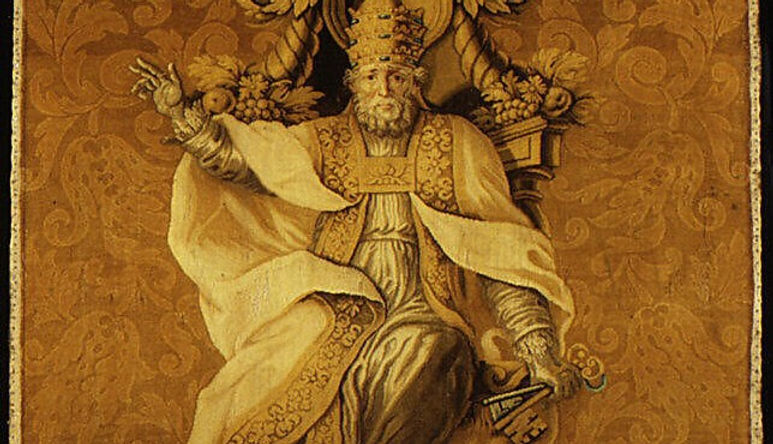St. Theodore the Studite
Keys, Rock of the Church, Chief of the Apostles, Prince of the Apostles, St. Peter, Shepherd
“In truth we have seen that a manifest successor of the prince of the Apostles presides over the Roman Church. We truly believe that Christ has not deserted the Church here (Constantinople), for assistance from you has been our one and only aid from of old and from the beginning by the providence of God in the critical times. You are, indeed the untroubled and pure fount of orthodoxy from the beginning, you the calm harbor of the whole Church, far removed from the waves of heresy, you the God-chosen city of refuge.” (St. Theodore the Studite of Constantinople [A.D. 759–826] Letter of St. Theodor & Four Abbots to Pope Paschal).
“Let him (Patriarch Nicephorus of Constantinople) assemble a synod of those with whom he has been at variance, if it is impossible that representatives of the other Patriarchs should be present, a thing which might certainly be if the Emperor should wish the Western Patriarch (the Roman Pope) to be present, to whom is given authority over an ecumenical synod; but let him make peace and union by sending his synodical letters to the prelate of the First See.” (Theodore the Studite, Patr. Graec. 99, 1420).
“Since to great Peter Christ our Lord gave the office of Chief Shepherd after entrusting him with the keys of the Kingdom of Heaven, to Peter or his successor must of necessity every novelty in the Catholic Church be referred. [Therefore], save us, oh most divine Head of Heads, Chief Shepherd of the Church of Heaven.” (Theodore, writing to Pope Leo III, Bk. I. Ep. 23 [Patrologia Graeca 99]).
“Hear, O Apostolic Head, divinely-appointed Shepherd of Christ’s sheep, keybearer of the Kingdom of Heaven, Rock of the Faith upon whom the Catholic Church is built. For Peter art thou, who adornest and governest the Chair of Peter. Hither, then, from the West, imitator of Christ, arise and repel not for ever (Ps. xliii. 23). To thee spake Christ our Lord: ‘And thou being one day converted, shalt strengthen thy brethren.’ Behold the hour and the place. Help us, thou that art set by God for this. Stretch forth thy hand so far as thou canst. Thou hast strength with God, through being the first of all. (Letter of St. Theodore and four other Abbots to Pope Paschal, Bk. ii Ep. 12, Patr. Graec. 99, 1152–3).
“Order that the declaration from old Rome be received, as was the custom by Tradition of our Fathers from of old and from the beginning. For this, O Emperor, is the highests of the Churches of God, in which first Peter held the Chair, to whom the Lord said: “Thou art Peter …and the gates of hell shall not prevail against it.” (Theodore, Writing to Emperor Michael of Constantinople, Bk. II. Ep. 86).
“I witness now before God and men, they have torn themselves away from the Body of Christ, from the Surpreme See (Rome), in which Christ placed the keys of the Faith, against which the gates of hell (I mean the mouth of heretics) have not prevailed, and never will until the Consummation, according to the promise of Him Who cannot lie. Let the blessed and Apostolic Paschal (Pope St. Paschal I) rejoice therefore, for he has fulfilled the work of Peter.” (Theodore Bk. II. Ep. 63).
"If they, arrogating authority, have not feared to summon a heretical council, who could not even summon an orthodox one without your authority, according to the ancient custom, how much more is it just and even necessary to hold a lawful one under your divine leadership… (Letter to Pope Leo III).
“We venerate images….not because we are assured that we are right by the second holy synod of Nicaea or by that which earlier decided divinely, but from the very coming of our lord and God in writing and without writing we have been made firm and rest securely upon that [Roman] See to which Christ say – you are Peter, and upon this rock I will build my church , and the gates of hell shall not prevail against it.”
“Now is the acceptable time that we [the Byzantine Church riddled with Iconoclasm] … should unite ourselves with Rome, the summit of the Churches of God, and through her to the three other Patriarchs [Alexandria, Antioch, Jerusalem]. (Letter to the Byzantine Emperor).
“This holy See holds the reign of the Churches of the world, not only on account of other things, but also because she remains free from the heretical stench.” (Epistola ad Renatum Presbyterum Romanum).

